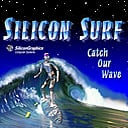Hey
I used to work with these two guys who introduced me to Be Boxes... I said I need to buy one before Be disappears (and they did, I wish I still had my BeBox). These two guys were ex-poker machine programmers (on Amigas, yes really). They raved and reved about NeXT, I never ever really got it at the time. I was doing C++ work with them in mid-1990s and knew about O-O concepts but with all this delegates, protocols, extending classes without inheritance, it made little sense to me at the time. I got into BeOS and found that fun and addictive, I was always hacking about in C++ with Be API until about the early 2000s, I wrote an article in Doctor Dobbs Journal about BeAPI and BeOS programming. Then all the BeOS clones came out and I grew very skeptical about the Be legacy and gave up, until I came back to Haiku a long time down the track. I stopped AmigaOS programming about AmigaOS 4.1 update 2, when ACube turned on the dealer base and started selling direct to the public, the X1000 was over promised, and never released.
When OS-X came out I tried Objective-C ...
At first I hated it. Really really hated it. I recoiled against what seemed wrong in in the object model and what I didn't understand..
Then I liked it but didn't really have that much of a clue, it was new and exciting and different.
Then (I thought) I really got to know it and hated it passionately.
Then after a long break came back to programming in Objective-C and found it to be fun and addictive. Maybe it should have been called Addictive-C..
My latest offering is
http://itunes.apple.com/us/app/cricket- ... ?ls=1&mt=8
I have barely one any IRIX or Haiku programming in ages.
If you want to learn Objective-C, learn smalltalk first. Things will make a lot more sense.
R.
I used to work with these two guys who introduced me to Be Boxes... I said I need to buy one before Be disappears (and they did, I wish I still had my BeBox). These two guys were ex-poker machine programmers (on Amigas, yes really). They raved and reved about NeXT, I never ever really got it at the time. I was doing C++ work with them in mid-1990s and knew about O-O concepts but with all this delegates, protocols, extending classes without inheritance, it made little sense to me at the time. I got into BeOS and found that fun and addictive, I was always hacking about in C++ with Be API until about the early 2000s, I wrote an article in Doctor Dobbs Journal about BeAPI and BeOS programming. Then all the BeOS clones came out and I grew very skeptical about the Be legacy and gave up, until I came back to Haiku a long time down the track. I stopped AmigaOS programming about AmigaOS 4.1 update 2, when ACube turned on the dealer base and started selling direct to the public, the X1000 was over promised, and never released.
When OS-X came out I tried Objective-C ...
At first I hated it. Really really hated it. I recoiled against what seemed wrong in in the object model and what I didn't understand..
Then I liked it but didn't really have that much of a clue, it was new and exciting and different.
Then (I thought) I really got to know it and hated it passionately.
Then after a long break came back to programming in Objective-C and found it to be fun and addictive. Maybe it should have been called Addictive-C..
My latest offering is
http://itunes.apple.com/us/app/cricket- ... ?ls=1&mt=8
I have barely one any IRIX or Haiku programming in ages.
If you want to learn Objective-C, learn smalltalk first. Things will make a lot more sense.
R.
_________________
死の神はりんごだけ食べる
アレゲはアレゲ以上のなにものでもなさげ -- アレゲ研究家






















 J5600, 2 x Mac, 3 x SUN, Alpha DS20E, Alpha 800 5/550, 3 x RS/6000, Amiga 4000 VideoToaster, Amiga4000 -030, 733MHz Sam440 AmigaOS 4.1 update 1. Tandem Himalaya S-Series Nonstop S72000 ServerNet.
J5600, 2 x Mac, 3 x SUN, Alpha DS20E, Alpha 800 5/550, 3 x RS/6000, Amiga 4000 VideoToaster, Amiga4000 -030, 733MHz Sam440 AmigaOS 4.1 update 1. Tandem Himalaya S-Series Nonstop S72000 ServerNet.
Sold:




Cortex ---> http://www.facebook.com/pages/Cortex-th ... 11?sk=info
Minnie ---> http://www.facebook.com/pages/Minnie-th ... 02?sk=info
Book ----> http://pymblesoftware.com/book/
Github ---> https://github.com/pymblesoftware
Visit http://www.pymblesoftware.com
Search for "Pymble", "InstaElf", "CryWhy" or "Cricket Score Sheet" in the iPad App store or search for "Pymble" or "CryWhy" in the iPhone App store.


 Keep the good work!
Keep the good work!
 I had some C and C++ background, but Objective-C was really something new for me. With the help of really extensive help and examples library i was able to go steps up every day and relatively quick.
I had some C and C++ background, but Objective-C was really something new for me. With the help of really extensive help and examples library i was able to go steps up every day and relatively quick.






 600mhz R14kA/2gb/V10
600mhz R14kA/2gb/V10
 8x1.4ghz Itanium 2/8GB
8x1.4ghz Itanium 2/8GB
 32x600mhz R14kA/24GB
32x600mhz R14kA/24GB

